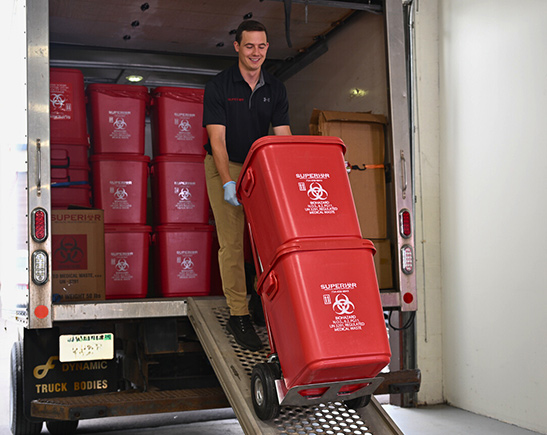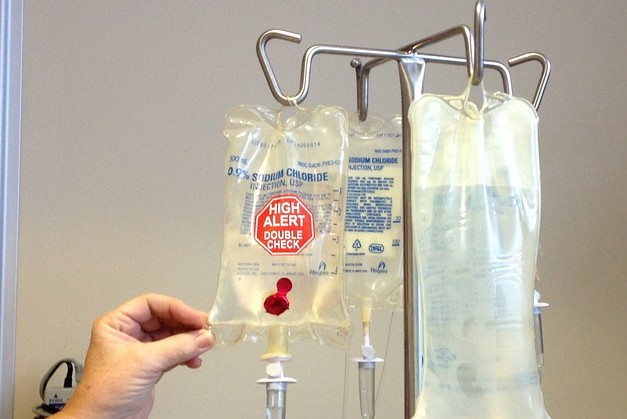Safeguarding Wellness: Expert Medical Waste Removal Services for a Clean Atmosphere
Safeguarding Wellness: Expert Medical Waste Removal Services for a Clean Atmosphere
Blog Article
Remain Ahead of Laws: Specialist Guidance on Medical Waste Disposal
In a globe where the medical care industry is continuously progressing, it is vital for clinical centers to remain in advance of regulations when it concerns the appropriate disposal of medical waste. With rigid standards and constant governing changes, it can be challenging to navigate the complexities of this process. Nevertheless, with skilled suggestions, centers can make certain compliance and mitigate risks related to incorrect garbage disposal. From comprehending the different classifications of clinical waste to carrying out the ideal collection and partition techniques, this conversation will offer important insights and workable pointers to help facilities remain in advance of guidelines in the ever-changing landscape of medical waste disposal.
Understanding Medical Waste Categories
Understanding medical waste groups is crucial for appropriate disposal and management in health care centers. Medical waste describes any waste produced by healthcare activities that might position a danger to public health or the atmosphere. It is crucial to categorize clinical waste accurately to ensure its secure handling, therapy, transport, and disposal.
There are a number of categories of medical waste that health care centers need to be accustomed to. One of the most typical groups include transmittable waste, pathological waste, sharps waste, pharmaceutical waste, and chemical waste. Each classification has details guidelines and laws for its proper administration and disposal.
Pathological waste refers to human cells, body organs, or body components that call for unique handling and disposal. Pharmaceutical waste makes up ended, unused, or polluted medications that need cautious handling and disposal.
Staying Up-To-Date With Regulatory Changes
Staying current with governing adjustments is essential for health care centers to make certain conformity and proper administration of clinical garbage disposal. medical waste removal near me. With regulations continuously developing, it is essential for medical care centers to stay current to stay clear of charges, fines, and potential harm to the setting and public health and wellness
To stay in advance of regulative changes, medical care centers ought to establish a system for surveillance and monitoring updates. This can be done by signing up for regulatory e-newsletters, going to workshops and conferences, and proactively taking part in industry associations. Additionally, facilities should mark an employee or group accountable for staying notified and distributing info to pertinent stakeholders.
Regular communication with regulative companies is additionally crucial. Medical care facilities must establish partnerships with local, state, and federal agencies to ensure they recognize any type of changes in policies that might impact their waste administration techniques. This can be done through routine conferences, engagement in public comment durations, and proactive interaction with governing agencies.
Furthermore, medical care facilities need to think about partnering with waste management companies that concentrate on medical garbage disposal (medical waste disposal services with WasteX). These companies are usually well-versed in the current laws and can provide assistance and assistance to make certain compliance
Implementing Appropriate Collection and Segregation Approaches
To efficiently manage medical waste disposal, health care centers need to develop correct collection and partition methods in accordance with regulative guidelines. Carrying out these approaches ensures the risk-free handling and disposal of possibly dangerous products, shields the environment, and lessens the risk of infections and injuries to healthcare workers and the public.
Correct collection and partition approaches entail the usage of marked containers and labeling systems. Health care facilities should offer clearly classified containers for different kinds of clinical waste, such as sharps, infectious waste, pharmaceutical waste, and non-hazardous waste. These containers should be color-coded and clearly marked to avoid confusion and promote simple identification.
Furthermore, medical care facilities ought to train their personnel on the proper treatments for collecting and setting apart clinical waste. This consists of informing them on the different kinds of waste, the suitable containers to make use of, and the relevance of complying with regulations and standards. Normal training sessions and correspondence course must be performed to make certain that team members remain up-to-date on best techniques.
In addition, medical care facilities should develop a system for normal collection and disposal of medical waste. This may include partnering with accredited waste management firms that concentrate on medical garbage disposal. These firms will guarantee that the collected waste is carried and taken care of in compliance with governing requirements.
Picking the Right Disposal Techniques

Incineration is just one of the most common and efficient methods for taking care of certain sorts of clinical waste, such as pathological waste and sharps. It includes the controlled combustion of waste at heats, lowering it to ash. Incineration can launch hazardous contaminants into the air and contribute to air pollution.

Various other disposal techniques consist of chemical treatment, microwave therapy, and landfilling. Chemical treatment includes using chemicals to neutralize the waste and decontaminate. Microwave treatment makes use of microwave energy to warmth and sanitize the waste. Landfilling entails burying the waste in a marked garbage dump location (medical waste disposal services with WasteX). Landfilling should be the last resort due to the prospective threat of contamination to dirt and groundwater.
Making Sure Conformity Through Documentation and Training
After very carefully considering the suitable disposal techniques for clinical waste, healthcare centers must guarantee conformity with laws and reduce ecological influence by implementing effective paperwork and training treatments. This action is essential in maintaining a safe and sustainable setting for both medical care employees and the general public.

Health care workers who handle clinical waste needs to get ideal training on waste partition, handling, and disposal procedures. By offering extensive training, healthcare facilities can equip their personnel to make informed choices and reduce the threat of inappropriate waste disposal.
Final Thought
In conclusion, remaining in advance of laws in clinical waste disposal is essential for health care facilities. medical waste removal services. Recognizing the different groups of medical waste, staying upgraded with regulatory modifications, carrying out appropriate collection and partition techniques, picking the proper disposal techniques, and guaranteeing compliance with paperwork and training are all vital actions. useful content By following these standards, health care organizations can efficiently get rid of and take care of of medical waste in a risk-free and accountable way
From comprehending the different classifications of medical waste to applying the right collection and partition techniques, this conversation will certainly give beneficial understandings and workable suggestions to assist centers stay in advance of policies in the ever-changing landscape of clinical waste disposal. - medical waste disposal services with WasteX
The most typical categories include infectious waste, pathological waste, sharps waste, pharmaceutical waste, and chemical waste. Medical care centers need to supply clearly labeled containers for different types of clinical waste, such as sharps, transmittable waste, pharmaceutical waste, and non-hazardous waste. Healthcare facilities need to develop a comprehensive system to tape-record and track all elements of medical waste disposal, including types of waste produced, quantities, and disposal methods used. see post Health care workers who deal with medical waste ought to obtain appropriate training on waste segregation, dealing with, and disposal procedures.
Report this page